DAVE'S DIARY - 12 AUGUST 2008 - REG LINDSAY OBITUARY
REG
LINDSAY RIP AT 79
FROM RODEO TO RADIO
BORN
- REGINALD LINDSAY - SYDNEY, NSW, JULY 27, 1929.
DIED - BELMONT, NSW, AUGUST 5, 2008
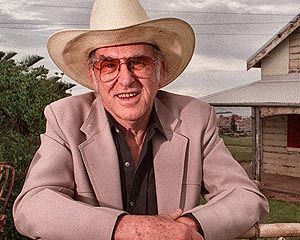 |
When
country music veteran Reg Lindsay finally succumbed to pneumonia at
79 it was the end of a 14-year battle with the Grim Reaper that began
in Tamworth in 1995. Lindsay, then 64, suffered a cerebral aneurysm at the January festival and valiantly fought for his life during a protracted stay in hospital. After a long rehabilitation period, the former radio and TV host and singer had a heart attack and underwent a triple bypass. |
But, despite
the enduring love of his second wife Roslyn, now 59, his quality of life
never improved sufficiently to enable him to enjoy the fruits of his labour.
Reg met the glamorous former barrel racer, steer roper and country chanteuse
when she was performing as Roslyn Winfield at a Cootamundra rodeo.
The couple wed on Brampton Island in 1988 and lived near Cessnock in the
Hunter Valley when not on the road touring.
It was just five years after he split with fellow singer and songwriter
Heather McKean who made her name with country pioneers The McKean Sisters.
Heather's sister Joy is the widow of revered bush balladeer and icon Slim
Dusty who died at 76 on September 19, 2003.
Reg owed his longevity to wife Roslyn who stood by her man and nursed
him through the tough times.
Roslyn, three daughters Dianne, Sandra and Joanne from Lindsay's first
marriage, and their extended families held a bedside vigil at Belmont
Hospital in Newcastle until he passed away over night on Monday August
4.
His son-in-law Peter Simpson said fans flooded the family with condolence
messages.
"There's been an absolute flood of phone calls and well-wishes. It's
absolutely astonishing," he said.
"It's a terrible loss," award-winning singer and fellow TV host
Tania Kernaghan said.
It was not just the end of a battle - but an era that enabled Lindsay
to pioneer country music on Australian commercial television.
Lindsay's shows, with sets strewn with hay bales, were a period piece
with the artists seemingly stranded like statues.
But they gave local artists much needed national exposure and preceded
other shows, with bigger budgets and vastly improved camera and lighting
techniques, hosted by Lee Conway and Mike McClellan.
The musical focus may have been relatively narrow compared with the eclectic
stretch of modern country but it was a stepping-stone.
That was four decades before Pay TV channels CMT and TNT in the U.S. and
later CMC in Australia and Nu Country TV on C 31 in Australia and New
Zealand.
BORN IN THE CITY - RAISED IN THE BUSH
Black boy in Chicago/ Playing in the street/ Not near enough to wear/ Not near enough to eat/ Don't you know he saw it/ He saw a man named Armstrong/ Walk upon the moon." - Armstrong - John Stewart.
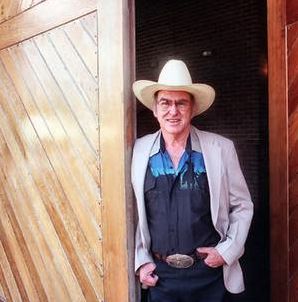 |
Lindsay
was born at Waverley in Sydney but spent his early years in Parkes
with his Hunter Valley reared father, who gave him his first harmonica
when he was two, and mother. The family moved to Adelaide when Reg was 10 and he was raised on country music on the radio and emulated his idols with his first guitar, given to him by an aunt at 15. In 1950, aged 21, he left for Sydney on an army dispatch motorbike to make his name on radio station 2SM's Tim McNamara talent quest. He won the final and in 1951 a recording contract with Rodeo Records. |
He shifted
to Sydney in the early fifties, playing gigs between stints in wool sales
and as an ABC rural broadcaster before committing to music full-time.
His first country music radio program aired on Sydney's 2CH in 1952.
Later that year, The Reg Lindsay Show switched to 2SM and stayed
there many years.
In 1954 he wed Heather McKean and began hosting The Country and Western
Hour on Channel Nine back in Adelaide in 1964.
The program went national soon after and ran on the Nine Network for eight
years - an amazing feat.
Reg Lindsay's next show Country Homestead aired for another four
years.
The programs earned Reg four Logies.
Lindsay, a prolific artist, released a plethora of country albums and
singles in a career spanning five decades.
The singer recorded local original material earlier in his career before
developing his penchant for a more American style with his most successful
songs being covers.
Most of his albums were released on vinyl but some have been re-released
on CD and as TV specials.
NASHVILLE
RECORDING
"The
rivers are getting dirty/ The wind is getting bad/ Wars and hate are killing
off/
The only earth we have/ But the world all stopped to watch it/ On that
July afternoon
To watch a man named Armstrong/ Walk upon the moon." - Armstrong
- John Stewart
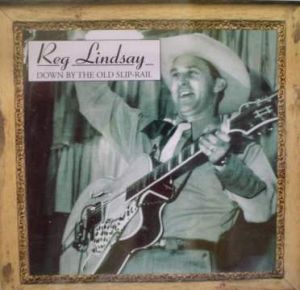 |
But
the TV shows gave the singer a launch pad for his lunge at international
success in a 20-year stint dividing his time living and working in
Australia and the U.S. Lindsay followed in the slipstream of Smoky Dawson and expatriate Kiwi singer and actor Tex Morton who blazed their U.S. performing and recording trail in the fifties. Lindsay headed to Nashville in 1968 and became one of the first Australians to guest on the Grand Ole Opry. The singer recorded for indie label Con Brio and scored regional airplay in southern markets despite not being on a major company. |
But his biggest
hit was here in Australia with Armstrong - a song penned by recently
deceased former Kingston Trio icon and latter day solo singer John Stewart.
Armstrong, inspired by astronaut Neil Armstrong's walk on the moon
in 1969, is part of a time capsule at NASA's space centre in Houston.
The song topped pop charts here in 1971 and shared widespread airplay
with another Stewart song - July, You're A Woman.
Sterling Whipple song Silence On The Line and Lewis Anderson's
Empty Arms Hotel were among others to score exposure for the singer.
One of Lindsay's latter recordings was yet another Stewart song Reasons
To Rise that he released after the murder of his son-in-law on the
NSW Central Coast.
Lindsay won three Golden Guitars at the Tamworth Country Music awards
in 1974, 1978 and 1980, and was inducted into the Tamworth Roll of Renown
in 1984 and the Hands of Fame three years later.
He was awarded an OAM in 1989 for services to country music and the entertainment
industry.
With a bizarre quirk of fate I was seated next to Lindsay's estranged
wife Heather at the prestigious 1983 Tamworth Golden Guitar Awards show
when she and sister Joy were admitted to the Australasian Country Music
Roll Of Renown.
As was the custom for winners, Heather turned and kissed her immediate
neighbour - it was me.
But those days the show was not televised so neither could wave to Reg,
in absentia.
HILLBILLIES HATE CHANGE
"Ain't it strange how hillbillies hate change/ say you went to Nashville/ but you never left Hicksville/ said you flew with Paycheck/ always got a fat cheque/ but you were just a hat check/ sweeping those barroom floors." - Hillbillies Hate Change - Darcy LeYear-David Dawson
It was during
Lindsay's overseas invasions he became a victim of the Nashville hype
machine with success missives sent back here that embellished feats on
a scale akin to fellow expatriates The LeGarde Twins from Queensland.
Reg may have embroidered his success, but unlike the teenage soldiers
who increased their age when they enlisted in the armed forces for overseas
battles, he lowered his in an ageist industry.
That and his diverse postcards and letters from the western front became
fertile fodder for community radio hosts in Victoria and beyond.
Lindsay was a true showman with critics eagerly awaiting exciting news
of his next adventure beyond the neon.
Reg enjoyed spinning yarns about adventures with gators, the Governor
Of Texas and other high flyers across the Pacific.
On one occasion he energised his equestrian imagery by parking his tour
vehicle and horse trailer, replete with horse, outside the PBS-FM studio
in Fitzroy Street, St Kilda.
Sadly Reg never got to mount his steed in Pokies - the gay bar - downstairs
from the PBS studio at the Prince of Wales hotel where latter day Texans
Steve Earle and Dale Watson strutted their stuff in the new millenium.
Such anecdotes also inspired the song Hillbillies Hate Change penned
by this writer and Darcy LeYear - better known for his success with The
Wolverines.
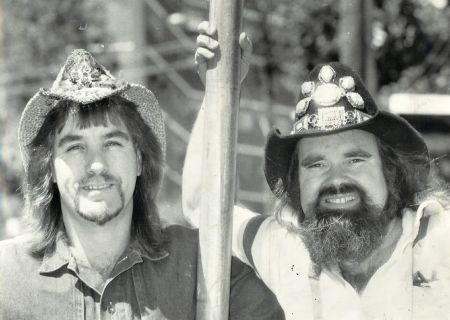 Darcy LeYear & David Dawson |
LeYear performed
the song, released by Lindsay's one time Australian record label Powderworks,
on Simon Townsend's Wonder World with actress Edith Bliss playing the
role of an ageing Australian country singer sweeping barroom floors in
Nashville.
The day the TV story appeared in the mass circulation, but now defunct
Sydney Daily Mirror, my co-writer LeYear was booked to open for Lindsay
in Grafton - hometown of Troy Cassar-Daley and latter day country-blues
singer-songwriter Don Walker.
LeYear performed Hillbillies Hate Change at all his Lindsay tour gigs.
Darcy confessed to his employer he wrote the melody but not the lyrics.
They were the domain of this diarist who was then the country and rock
music feature writer and columnist on the Daily Mirror.
"Reg would ask after each performance if the song was really about
him," LeYear said back then.
"I told him it was about hillbillies who hadn't made it."
They included Sydney country singer Brian K Kelly - a graduate from the
old school of vintage nasal whine.
Ironically, another Daily Mirror journalist Carol Knight, was subject
of Jodie - also penned and recorded by LeYear - and this diarist.
THE LEGACY
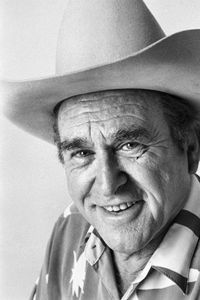 |
The
country music veteran was one of the first Australians to use Nashville
as a base to attack the U.S. market. His success may have been modest compared with latter-day superstar Keith Urban and Olivia Newton-John and peers diverse as Jedd Hughes, The Greencards, Sherrie Austin and Jamie O'Neal. But, to his credit, he made his lunge at international acclaim when Australian country artists had little clout beyond their homeland. Lindsay may have been considered old school by the flourishing progressive country scene at home and overseas but he stuck to his guns. Having the temerity to leave the cloistered confines of the local scene polarised many in the Australiana country music industry. |
The singer was an island in the stream - local hillbillies ostracised him because he was perceived as too American.
And the young
guns of the progressive scene parodied him because of preference for genuine
outlaws like Waylon, Willie, David Allan Coe, Johnny Paycheck, Ray Wylie
Hubbard, Billy Joe Shaver and Hank Williams Jr and their Aussie protégées.
But there was a grudging admiration for Lindsay's utilisation of the Barnum
& Bailey ethos of beating a drum for his muse.
Sadly, the protracted ill health of the singer prevented him from sharing
the success of the new generation of expatriate Australians overseas and
at home.
But, like the character in his biggest hit Armstrong, the singer is now
exploring extra terrestrial territory with Slim, Smoky, Tex, Buddy, Shorty
and the bunkhouse boys.